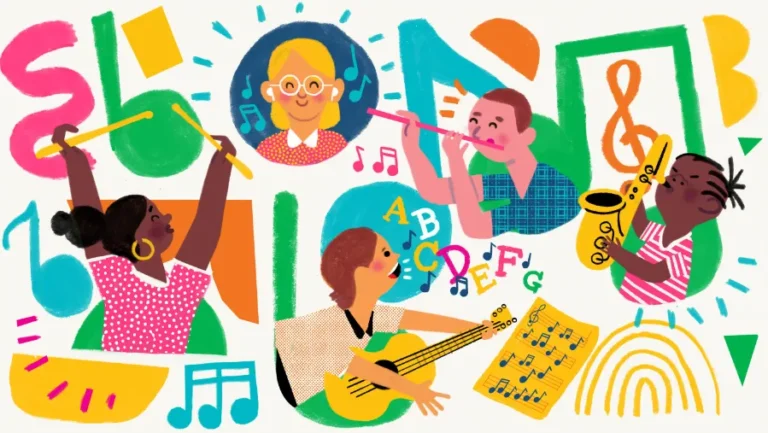Learning music is a journey that enriches the mind, nurtures creativity, and brings joy to both the learner and those who hear their music. Whether it’s playing an instrument, understanding music theory, or simply appreciating various genres, the process of learning music offers numerous mental, emotional, and social benefits. This article explores why learning music is essential and how it can positively impact different aspects of life.
1. Enhances Cognitive Abilities
One of the most well-documented benefits of learning music is its positive impact on cognitive development. Studies show that children who learn to play musical instruments or engage in musical training tend to perform better academically. Music learning enhances memory, improves attention span, and increases problem-solving skills. For adults, playing music helps sharpen the brain and may even delay cognitive decline.
2. Develops Discipline and Patience
Learning music requires regular practice and dedication. Whether you’re mastering a challenging piece on the piano or learning the guitar, progress often takes time. This process helps build discipline, perseverance, and patience. Setting goals, working towards them, and experiencing gradual improvement mirrors how success is achieved in other areas of life. Music learners often develop strong work ethics, as the consistent effort required to improve fosters a disciplined approach to learning.
3. Boosts Emotional Well-Being
Music is a powerful emotional outlet. Whether you’re playing, singing, or simply listening to music, it can evoke deep feelings and provide a way to express emotions that might be difficult to articulate with words. For many, music offers a therapeutic experience, relieving stress, anxiety, and even symptoms of depression. Playing music also triggers the release of dopamine, the brain’s “feel-good” neurotransmitter, which enhances feelings of happiness and satisfaction.
4. Encourages Creativity and Self-Expression
Music is inherently creative, allowing individuals to explore and express their unique artistic styles. Whether through improvisation, songwriting, or exploring different musical genres, learning music encourages experimentation and artistic growth. Musicians often develop their voice and signature style, and for those pursuing a deeper understanding of music theory, it offers a framework to explore creative possibilities.
5. Improves Social Skills and Builds Connections
Music has a unique way of bringing people together. Whether it’s participating in a band, joining a choir, or simply playing music with friends, learning music fosters collaboration and enhances social skills. It encourages teamwork, active listening, and mutual respect as musicians must coordinate and harmonize with one another to create cohesive performances. For students, learning music in group settings like school bands or orchestras helps them build friendships and enhance their communication skills.
6. Music in the Digital Age: Online Learning and Apps
With the rise of digital platforms and apps, learning music has become more accessible than ever. Many online platforms offer tutorials, lessons, and practice tools for aspiring musicians. Apps that help learners practice scales, read music, and even compose songs have become integral parts of the learning process. In fact, some apps also combine learning with gaming elements to make the experience more engaging. For instance, platforms like win 101 login integrate both gaming and educational elements, offering fun and interactive ways to improve your skills while keeping learners engaged.
7. Builds Confidence and Performance Skills
Mastering a musical instrument or performing in front of an audience can significantly boost confidence. The ability to play a song or perform live in front of others is an accomplishment that fosters a sense of pride. Music learners often gain confidence as they progress in their skills, which can positively influence other areas of life, including public speaking, leadership roles, and tackling new challenges.
Conclusion
Learning music is a deeply rewarding experience that goes beyond simply mastering notes or techniques. It enhances cognitive abilities, improves emotional well-being, fosters creativity, and strengthens social connections. With the advent of digital tools and platforms, music learning has become more accessible to people of all ages and skill levels. Whether you’re picking up an instrument for the first time or expanding your musical knowledge, the journey of learning music is one filled with lifelong benefits.
